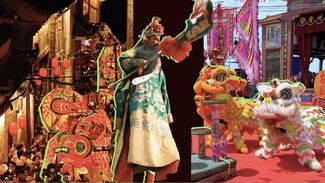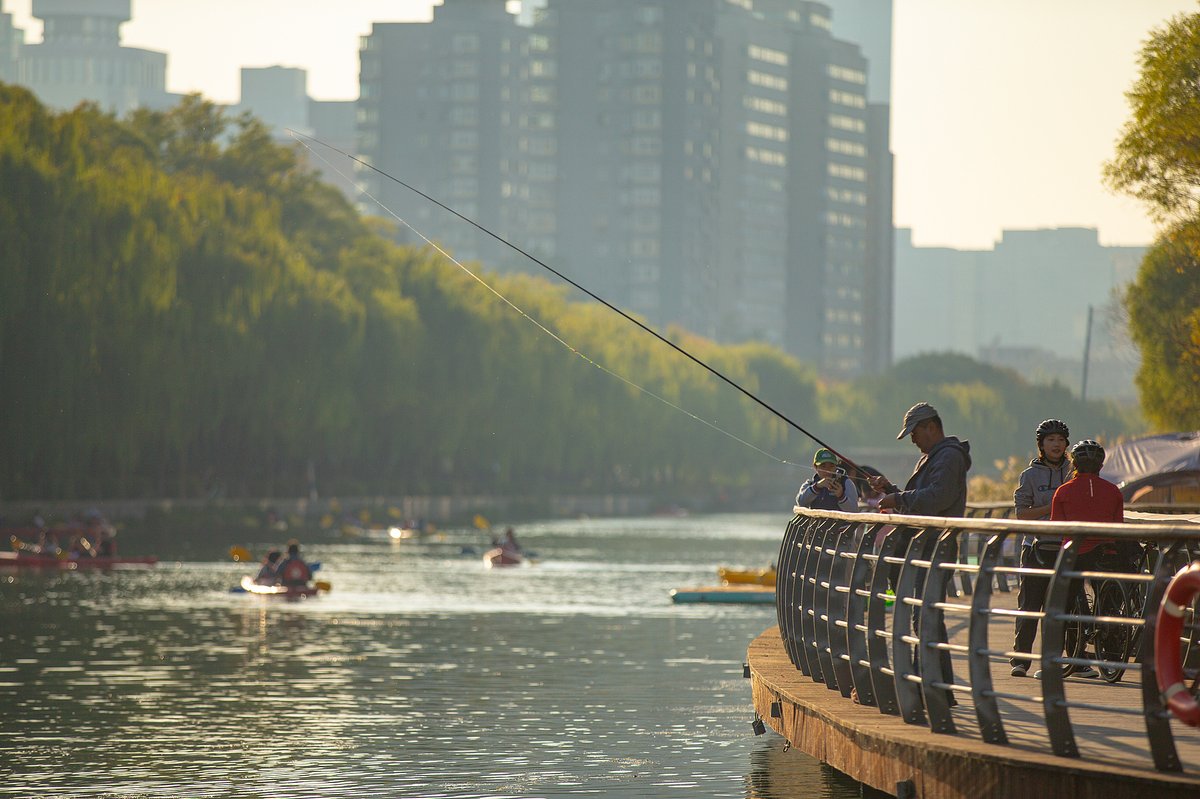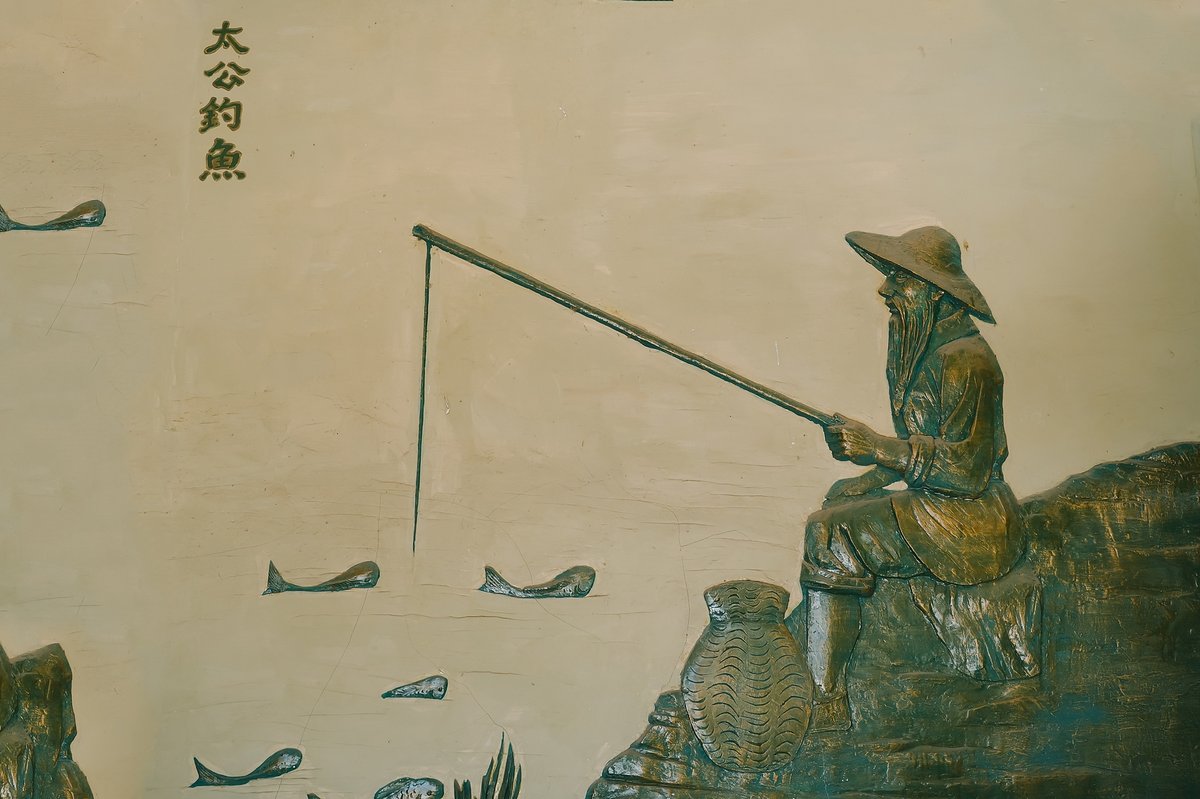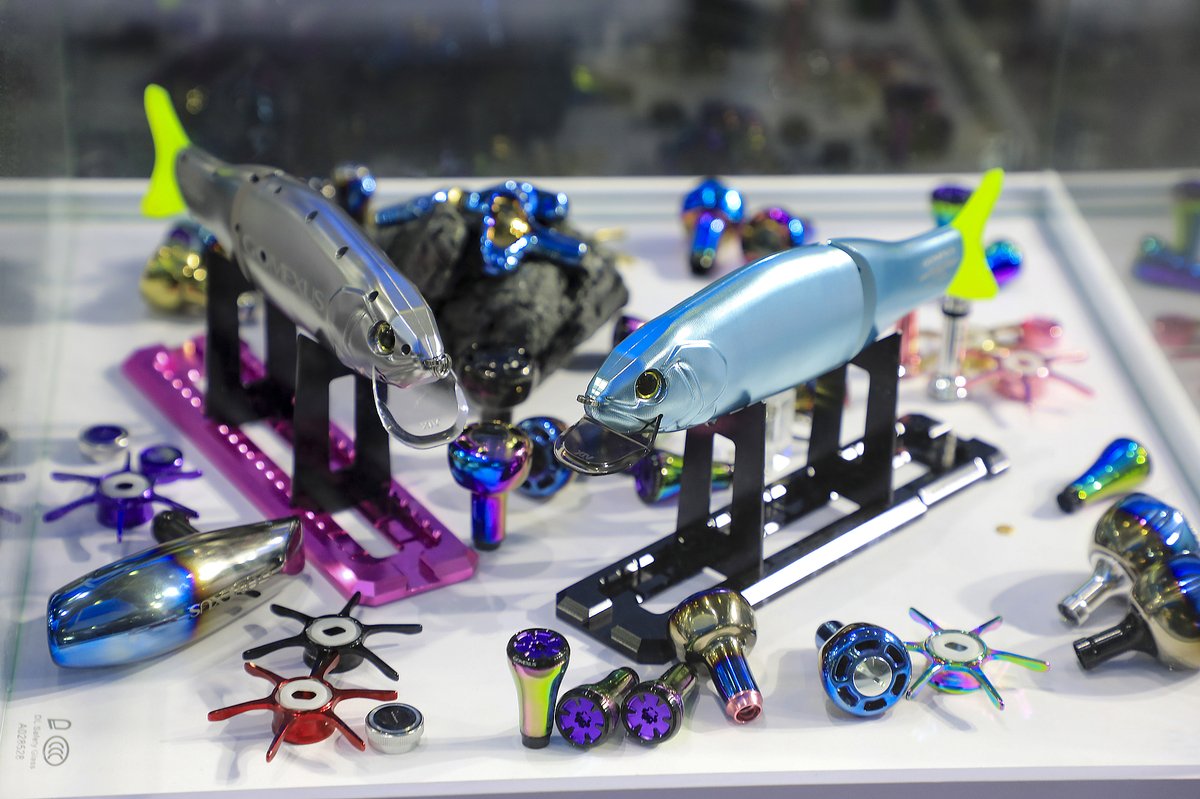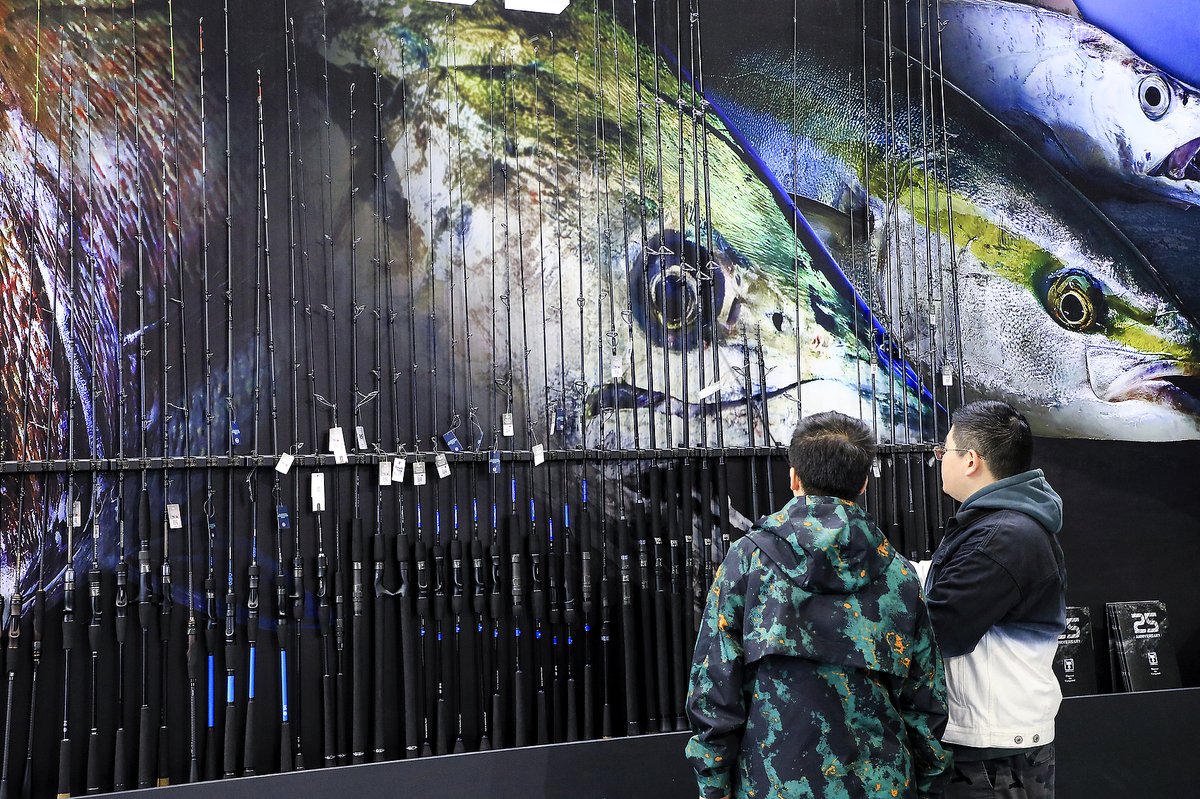China’s urban youths are recasting fishing, an ancient activity associated with retirees, into modern struggles and philosophies
On a drizzly summer afternoon along Beijing’s Yuan dynasty city ruins, Wu Xing sneaks out from his office during lunch break with a collapsible fishing rod. The 30-year-old, who works as an algorithm researcher, describes these piecemeal stolen moments as his mental reset button.
“I don’t meditate—I fish,” Wu pronounces, watching his float bob in the moat.
Fishing, once seen as a pastime for retired men in bucket hats, has surged in popularity among China’s stressed urban youth for its accessibility, flexibility, and supposed mental healing powers. Data from the China Angling Association, a nonprofit social group founded in 2012, finds that over 45 percent of the country’s 160 million fishing enthusiasts are aged 25 to 44. Purchases related to fishing equipment made by customers under 26 nearly quadrupled from 2020 to 2023, according to e-commerce site JD Sports.
Read more about youth trends in China:
- Hills to Hashtags: Could Trail Running be China’s Next Online Trend?
- Pool’s Big Break Among China’s Youth
- Below the Surface: How Divers Navigate Bans and Travel Restrictions to Pursue their Passion
Lu Kewen, a 21-year-old student from Jiaxing, Zhejiang province, just joined the fishing craze seven months ago. She recalls how sitting by the water helped calm her anxious behaviors, like scratching her head and playing with her hair. “Watching the float quiets my mind,” she tells TWOC, “I just stare at the colorful marker bobbing on the water and let my mind wander.”
Fishing has become an unlikely form of therapy for this anxiety-prone student juggling finals and internships. As a child, Lu’s first and only fishing trip was cut short by a broken rod and a father uninterested in taking her out, so she never fished again until her new girlfriend—a seasoned angler and patient teacher—unpacked a starter kit on the banks of a creek in Hangzhou. “She showed me how to hold the rod properly, how to adjust the angle and cast the line, and how to follow the flow of the float instead of constantly checking my phone,” Lu describes. The lessons stuck.
As she prepares for her final year of university and the pressures of adult life, Lu plans to continue fishing with a compact micro-gear that fits easily between classes and internships. “You can go anywhere with these little packs,” she explains, already envisioning future outings.
Micro-fishing, or xiaowudiao (小物钓), is a specialized angling practice focused on catching small fish species using ultra-lightweight tackle and delicate techniques. Originating from Japan, it has gained popularity among beginners, especially young women, due to its light equipment and novice-friendly experience.
“I found the equipment very easy to handle, time-saving, and flexible, so I decided to buy in,” says Yu Wenxi, a novice fisher and 35-year-old founder of a high-end wedding-planning start-up in Beijing. Her hectic routine and sedentary life give her little opportunity to go outdoors or enjoy the sun. At a friend’s invitation to go micro-fishing a year ago, she immediately fell in love with the easy sport.
Despite zero fishing experience and little talent for outdoor sports, Yu feels quite confident about her skills: “You don’t need to learn any techniques. The equipment is a very full set. I think this becomes the main reason for attracting many girls to the sport.” According to Yu, Beijing is full of waterways, big and small, and she rarely leaves without any catch. She now carries a set of micro-gear in her purse so she can cast anytime and anywhere she wants.
The flexibility of fishing has helped many enthusiasts navigate an efficient work-life balancing act across the city’s concrete jungles and water labyrinths. For Wu, who started fishing as a child, the pastime has become his antidote to digital fatigue. His approach is methodical: shallow-water angling in urban waterways during short work breaks, where he can catch small fry; and weekend expeditions to reservoirs on the city outskirts for more common species like carp or catfish. If there’s time, he would spend a few days camping near a reservoir to prolong his time in nature.
Fishing runs deep in China’s cultural consciousness, more than mere sport or sustenance. Over 2,000 years ago, the Daoist sage Zhuangzi (庄子) delivered his well-known debate on the happiness of fish by the Hao River. Around the same period, the strategist Jiang Ziya (姜子牙) spent about ten years fishing without bait by the Wei River before finally meeting his patron, the future King Wen of Zhou. Jiang’s straight hook became a metaphor for attracting talent by virtue rather than force: “When Lord Jiang fishes,” the old saying goes, “there are always those willing to take the bait.”
These stories reveal fishing’s dual role in Chinese tradition: both as a practical skill and a profound philosophy. In the Tang dynasty (618 – 907), fishing became a means for many disgraced officials to retreat into anonymity, using angling to dispel sorrow and evade worldly troubles. The most well-known among them is the poet Liu Zongyuan (柳宗元), who wrote in his poem “Snow on the River《江雪》”:
Over a thousand mountains, no birds in flight;
On ten thousand paths, no trace of humans in sight.
A lone boat, an old man in a straw cloak and hat;
Fishes alone in the cold river snow.
Celebrated across generations as a masterpiece of fishing literature, the poem depicts a scene—an empty world frozen in silence, an old fisherman steadfastly angling in solitude—that metaphorically reflects the poet’s unyielding integrity even after his political downfall. The “lonely old man in a straw hat” thus became the iconic image of a fisherman.
By the Song dynasty (960 – 1279), the spiritual essence of fishing became deeply intertwined with Daoist philosophy, particularly the concept of Wu Wei (无为), or “non-action.” Rather than passivity, it advocates for effortless action, aligning with the natural flow of the universe instead of forcing outcomes through struggle. Whether serving in court or living in seclusion, scholar-officials embraced fishing as a symbol of their ideals—harmony with nature, freedom from societal constraints, and moral purity.
Today, the marriage of ancient philosophy with modern psychology manifests across many fishing styles. Cao Lei, a 32-year-old freelance artist, is a fan of lure fishing, or luya (路亚). A technique popularized by Gen Z, lure fishing uses artificial baits to mimic prey, emphasizing continuous casting and retrieval to attract predatory fish. Cao calls the act “gu-fishing,” inspired by the Chinese set phrase 沽名钓誉 (gūmíng diàoyù), literally “to fish for praise”—centering on the calculated, performative, and proactive pursuit of honor.
“Each cast and search in an unknown waterway is like a treasure hunting experience. The thrill got a lot of men like me hooked,” says Cao, whose Xiaohongshu, or RedNote, account documents fishing expeditions from Moscow to Osaka and attracts comments from worldwide. He recounts impressing locals, and even other Chinese abroad, by fishing near well-known tourist destinations around the world, and offers tips and techniques in his Xiaohongshu posts. “I think that when you travel where beautiful and scenic, it would be a pity if you only take photos. Fishing is a really good way to explore the local environment and make friends.”
Given the massive reward and emotional roller-coaster ride, fishing can become addictive, with a hidden dark side. Cao remembers that the first year he started fishing, he suffered from sleep deprivation due to the early hours, late nights, and long periods spent stationing by the water to get the best catch. Only through fatigue and burnout did he gradually learn to balance it with his regular fitness habit. Others, perhaps less-disciplined, have inspired an internet meme: the “Fisherdude (钓鱼佬),” an intensely competitive, obsessive angler who neglects work and family to fish, and is determined to never return empty-handed—even if they have to pick some wild vegetables, or “take a few gulps of water before leaving.”
“You can say that fishing is actually a form of gambling, but with very, very low stakes,” says Wu. The intensity of focus and instant rewards of the sport form a positive feedback cycle, making it easy to get hooked. “The logic for addiction is the same, like in the lottery.”
The philosophical and scientific approach of young anglers sometimes puts them in a cultural clash with the silver-haired men who traditionally ruled China’s fishing spots. “I think the old-timers were genuinely surprised to see a woman with a rod,” Yu recalls of her early outings. They would come over to check if she’d baited her hook properly—only to walk away, confused, by her colorful and surprisingly effective micro-gear.
Besides this clash of the old and the new and the transgressing of gender boundaries, the fun of fishing also lies in the wisdom of sharing. One year into the sport, Yu has now joined a local girls’ fishing group of some 300 members, where they regularly organize events via WeChat. Their favorite spot is Beijing’s Liangma River, alongside local grandpas. Wu also regularly gives out his catches to the strolling grandpas in the park.
“Ancient Chinese literati didn’t fish to eat,” says Cao, echoing the classic wisdom. “They fished to cultivate patience, to observe nature’s rhythms, and to achieve that perfect balance between action and inaction.” That said, he occasionally runs into illegal poachers who fish using electric nets, and this spurs him into action: He waits until they’re gone and quietly confiscates their equipment.
China has several regulations on civil fishing, including bans in protected waterways and a 10-year ban on all productive fishing in the Yangtze River, issued in 2020. “As long as these constraints are met, the impact of individuals’ fishing activities on the environment is actually minimal,” Yang Guihong, associate professor of the School of Economics & Management at Beijing Forestry University, tells TWOC.
In June of this year, a draft of an amendment to the Fisheries Law was introduced. It aims to encourage recreational fishing activities as a form of leisure by improving regulations and clearly demarcating them from industrial fishing operations.
As the sun sets over the stretch of water where the Mongols once built their empire, Wu packs his rods, puts on his hat, and nods goodbye to his new retiree friends. China’s young urbanites are quietly rewriting the social contract of leisure, blending millennia-old philosophy with contemporary rebellion.
More than just a trend, the fishing revival is a coping mechanism for a generation squeezed between ambition and exhaustion. “We’re not ‘lying flat,’” says Wu. “We’re lying in wait.”
Hooked on Serenity: China’s Gen Z Fishing Revival is a story from our issue, “Urban Renewal.” To read the entire issue, become a subscriber and receive the full magazine.


